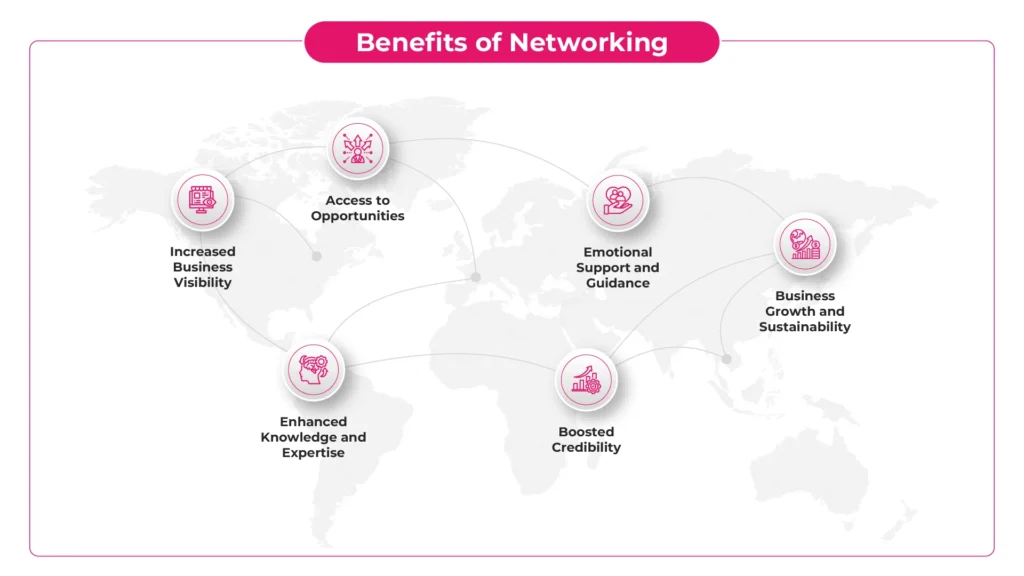In the world of business, connections matter as much as competence. The relationships you build can open doors to opportunities, insights, and growth that would otherwise remain out of reach.
Business networking is the process of building and nurturing relationships with other professionals. These relationships can span industries, roles, and geographic locations. Networking is not just about exchanging information or seeking immediate gains; it’s about creating genuine connections that add mutual value over time.
Many business owners underestimate the power of networking or don’t know where to start. This guide dives into why networking is indispensable, the value it brings to your business, and actionable strategies to help you build a robust professional network.
The Importance of Networking
Networking as a Vital Business Skill
Networking is more than a social activity; it’s a critical business skill that can shape the trajectory of your career or enterprise. Whether you’re an entrepreneur or executive, networking helps you tap into a world of untapped potential. Through conversations, collaborations, and shared insights, you create pathways for innovation, partnerships, and growth.
But what makes networking so vital? It’s the foundation of business ecosystems. Every great opportunity, be it funding, mentorship, or partnerships, often begins with a conversation. When approached strategically, networking isn’t just about who you know; it’s about who knows you and values your expertise.
How Networking Creates Opportunities
Networking broadens your horizons. When you engage with the right people, you expose yourself to opportunities that align with your goals. For instance:
- Partnerships: Collaborating with like-minded businesses or professionals can lead to shared ventures and resources.
- Clients: Networking can help you attract new customers through referrals and word-of-mouth.
- Career Growth: A strong network can connect you to job opportunities, promotions, or industry insights.
Every interaction is a potential gateway. A casual introduction at an event could lead to a major client or investor down the line.
Building Relationships and Trust
At the heart of networking is the ability to build genuine relationships. People do business with those they trust, and trust is earned through consistent, meaningful engagement. Networking isn’t about quick wins or superficial connections; it’s about investing in relationships over time.
When you nurture trust within your network, you establish yourself as a reliable partner, a knowledgeable resource, and someone who delivers value. Trust transforms professional acquaintances into loyal advocates who champion your growth.
Benefits of Networking
The value of networking is immeasurable, but let’s break it down into tangible benefits:

- Increased Business Visibility
Networking puts you on the radar. Whether at events or online, the more people see and hear about your expertise, the more likely they are to remember and recommend you. - Access to Opportunities
From investment deals to collaborations, a robust network connects you to opportunities you might never have discovered independently. - Enhanced Knowledge and Expertise
By engaging with others, you gain new perspectives, industry insights, and practical advice that can propel your business forward. - Emotional Support and Guidance
Entrepreneurship and professional growth come with challenges. A supportive network provides encouragement, mentorship, and a sense of community during tough times. - Boosted Credibility
Being associated with well-connected and reputable individuals enhances your own credibility and authority in your field. - Business Growth and Sustainability
A strong network is a pipeline of potential clients, investors, and collaborators who drive growth and ensure your business’s longevity.
The Importance of Business Networks
-
Enhancing Credibility and Visibility
Belonging to professional or business networks—like trade associations, industry forums, or community groups—can significantly enhance your credibility. When you’re an active participant, you position yourself as a thought leader and a trusted voice in your industry.
For example, speaking at a networking event or sharing insights on a professional platform builds your reputation and increases your visibility. People begin to associate your name with expertise and reliability, opening doors for new opportunities.
-
Driving Business Growth and Sustainability
A well-maintained network acts as an ecosystem that supports your business’s growth.
Here’s how:
- Referrals: Satisfied connections recommend your services to others.
- Collaborations: Working with others in your network can lead to innovative solutions and shared success.
- Support During Challenges: A strong network can provide advice, resources, or even financial backing when times get tough.
Examples of Successful Networking Leading to Investment Opportunities
Networking has consistently played a pivotal role in shaping the trajectory of iconic businesses. Below are real-life examples of how strategic connections have paved the way for groundbreaking investment opportunities.
-
Mark Zuckerberg and the Birth of Facebook

When Mark Zuckerberg co-founded Facebook in 2004, it was a simple college networking tool. However, it wasn’t until Zuckerberg connected with Sean Parker, the co-founder of Napster, that Facebook’s potential exploded.
Sean Parker saw what others didn’t: Facebook could dominate the social networking landscape. Leveraging his existing network, Parker introduced Zuckerberg to Peter Thiel, the billionaire co-founder of PayPal. Thiel immediately recognised the platform’s promise and became Facebook’s first major investor, injecting $500,000 in seed funding.
Networking Lesson: Without Parker’s introduction, Zuckerberg may not have secured Thiel’s investment at a critical stage. This illustrates the importance of connecting with individuals who not only believe in your vision but also have the influence and resources to support it.
-
Elon Musk and the SpaceX Revolution

In the early days of SpaceX, Elon Musk faced skepticism from potential investors who doubted his ability to disrupt the aerospace industry. Musk’s breakthrough came through his ability to network within Silicon Valley, where he had already established credibility with PayPal.
One of Musk’s most significant early supporters was Google’s Larry Page, whom he had connected with during PayPal’s success. Page believed in Musk’s vision and reportedly offered substantial support during SpaceX’s challenging early years. Musk also networked tirelessly to secure government contracts, building relationships with NASA officials and private equity investors, which eventually positioned SpaceX as a leader in the commercial space industry.
Networking Lesson: Relationships built during previous ventures can become a foundation for future opportunities. Musk’s existing network provided financial backing and industry access that were critical to SpaceX’s growth.
-
The Rise of Airbnb

In 2008, Airbnb was struggling to gain traction. Founders Brian Chesky, Joe Gebbia, and Nathan Blecharczyk had a unique idea but lacked funding to scale. Their turning point came through Y Combinator, a renowned startup accelerator, where networking with mentors and peers transformed their fortunes.
At Y Combinator, Airbnb’s founders were mentored by Paul Graham, who helped them refine their pitch and business model. This mentorship led to Airbnb securing $20,000 in seed funding, followed by introductions to early investors like Sequoia Capital. These connections provided the financial resources and guidance needed to grow Airbnb into the global hospitality giant it is today.
Networking Lesson: By entering a supportive network like Y Combinator, Airbnb gained access to mentorship and investment opportunities that were otherwise out of reach.
-
Howard Schultz and Starbucks’ Global Expansion

When Howard Schultz envisioned turning Starbucks into a global brand, he needed funding to acquire the company from its original owners. Schultz relied heavily on his networking skills, reaching out to venture capitalists and influential business leaders.
One of Schultz’s most significant breakthroughs came through a meeting with Bill Gates Sr., father of Microsoft co-founder Bill Gates. Gates Sr. introduced Schultz to investors who believed in his vision of creating a “third place” between home and work. These connections enabled Schultz to raise $3.8 million in 1987, leading to Starbucks’ eventual global dominance.
Networking Lesson: Schultz’s story highlights how introductions from trusted connections can open doors to transformative investment opportunities.
-
Reid Hoffman and the Birth of LinkedIn

Reid Hoffman, the co-founder of LinkedIn, is widely regarded as one of Silicon Valley’s best networkers. His connections with early PayPal employees and other tech entrepreneurs were instrumental in building LinkedIn into the world’s largest professional networking platform.
Hoffman’s close ties with Peter Thiel, Max Levchin, and Elon Musk from the PayPal days enabled him to secure funding and advice for LinkedIn. Later, his network expanded to include major venture capitalists like Greylock Partners, which invested $10 million in LinkedIn’s early stages.
Networking Lesson: Building a strong network early in your career can yield exponential returns when launching new ventures.
-
Sara Blakely and Spanx

Sara Blakely, the founder of Spanx, turned her innovative shapewear idea into a billion-dollar brand by leveraging her network effectively. Initially, Blakely struggled to get her product noticed. Her big break came when she connected with a buyer from Neiman Marcus through a friend’s recommendation.
That single introduction led to Spanx being stocked in Neiman Marcus stores, catapulting the brand into the spotlight. Later, Oprah Winfrey, whom Blakely had met through strategic networking, endorsed Spanx on her show, further skyrocketing its success.
Networking Lesson: Building relationships with key decision-makers can create opportunities that redefine your business’s trajectory.
-
Richard Branson and Virgin Group

Richard Branson’s ability to network with influential figures has been a cornerstone of Virgin Group’s success. In the early days of Virgin Records, Branson connected with prominent artists and industry executives to build the label’s reputation.
Later, when launching Virgin Atlantic, Branson leveraged his connections to secure partnerships and funding, including a critical meeting with Boeing executives to lease his first aircraft. His relationships with business magnates like Nelson Mandela and Bill Gates have further bolstered Virgin’s global brand.
Networking Lesson: Branson’s story emphasises that successful networking isn’t just about raising money—it’s about creating lasting partnerships that fuel long-term growth.
Online vs Offline Networks
The Role of Social Media in Networking
In today’s digital world, social media has become a powerful networking tool. Platforms like LinkedIn, Twitter, and Instagram allow you to connect with professionals worldwide, build your brand, and share your expertise.
- Global Reach: Online networking breaks geographical barriers, enabling you to connect with diverse professionals.
- Personal Branding: Sharing thought leadership content establishes you as an authority in your field.
- Consistent Engagement: Social media keeps your network updated on your achievements, projects, and insights.
Offline Networking: The Human Touch
Despite the rise of digital networking, face-to-face interactions remain invaluable. Meeting someone in person allows for deeper connections and stronger rapport. Offline networking opportunities include:
- Conferences and Events: Industry gatherings offer a chance to meet professionals with shared interests.
- Local Meetups: Engaging with your local community can lead to long-lasting relationships.
- Workshops and Seminars: Learning environments foster connections with like-minded individuals.
The best networking strategy combines the strengths of both online and offline channels. Use social media to cast a wide net and offline events to solidify and deepen relationships.
Conclusion
Networking is a powerful tool for professional and business growth. It enhances visibility, builds trust, and opens doors to opportunities that fuel success. Both online and offline networks have unique advantages, and balancing the two ensures you make the most of your connections.
Networking isn’t something to put off for tomorrow. Start today by reaching out, attending events, or sharing your expertise online. Each small step brings you closer to a thriving network that supports your goals.
At the Matt Haycox Group, we understand the value of strong connections. If you’re keen to grow your network or enhance your business prospects – get in touch today!
